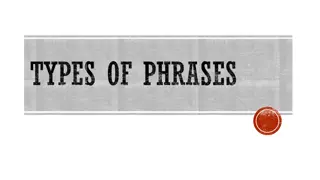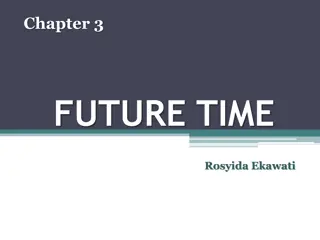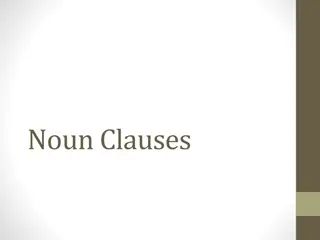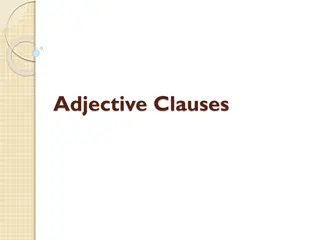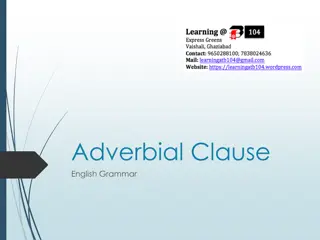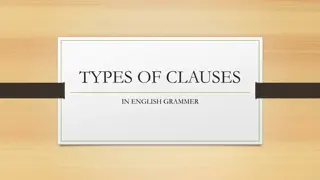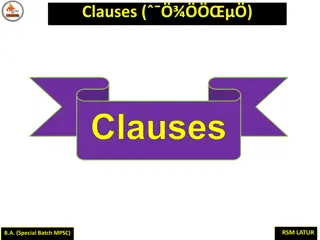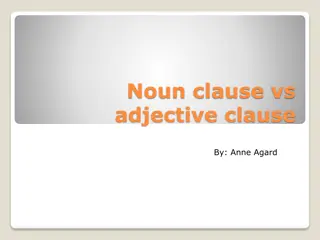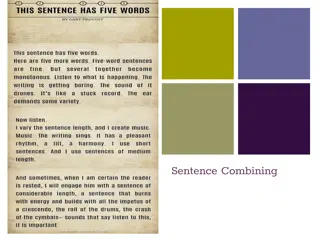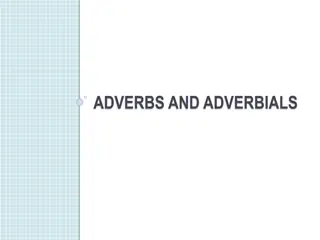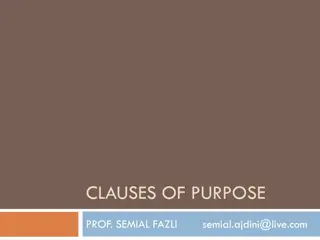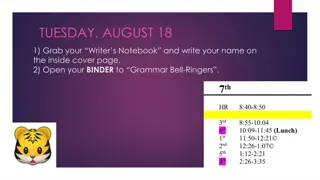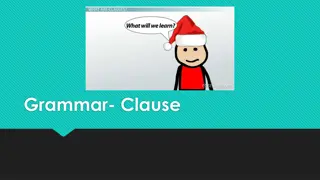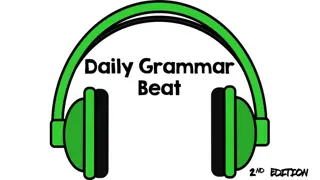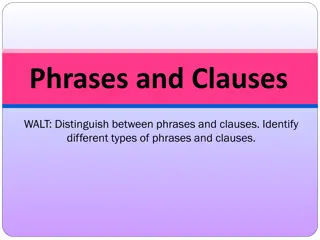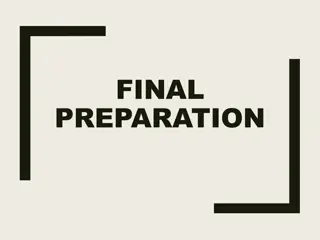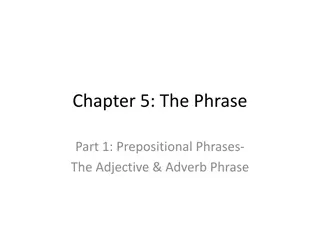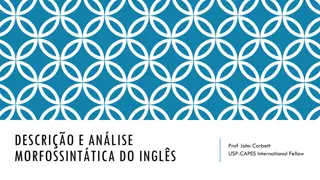Understanding Phrases and Clauses in English Grammar
This content dives into the concepts of phrases and clauses in English grammar, presented by Assistant Professor Dhanaji V. Thore. It explains how a phrase is a group of related words lacking a subject and predicate, while a clause contains both a subject and a predicate to form a complete sentence. The content discusses various types of phrases like prepositional, noun, adverb, adjective, verb, infinitive, participle, and gerund phrases, along with examples showcasing their functions in sentences. It also elucidates the structure and characteristics of verb phrases, adjective phrases, adverb phrases, and participial phrases.
Uploaded on Sep 28, 2024 | 0 Views
Download Presentation

Please find below an Image/Link to download the presentation.
The content on the website is provided AS IS for your information and personal use only. It may not be sold, licensed, or shared on other websites without obtaining consent from the author. Download presentation by click this link. If you encounter any issues during the download, it is possible that the publisher has removed the file from their server.
E N D
Presentation Transcript
Phrases and Clauses Presented by Dhanaji V Thore Assistant Professor, Dept of English Shri Chhatrapati Shivaji College, Omerga
Group of related words (within a sentence) that lack subject and predicate(verb). Phrase can not express the complete idea or thought. Phrase does not include the subject and the verb at the same time and doesn t make a complete sense, thus; phrase can not be a sentence.
He is standing near a wall. The girl with blue eyes is my cousin. To become a good lawyer is my aim. More than one phrase in a sentence I will meet you at 3pm, in front of the gate in the park.
Prepositional Phrase Noun Phrase Adverb Phrase Adjective Phrase Verb Phrase Infinitive Phrase Participle Phrase Gerund Phrase
Verb Phrase Consists of noun & related words (modifiers). It functions like a noun in the sentence Combination of Main Verb and its auxiliaries (helping Verb) in the sentence. The girl on the stage is singing. The girl with blue eyes bought a beautiful dress. She is reading a book. She has been reading a book for two hours.
Adjective Phrase Group of words function as adj. Consists of adj, modifiers and any word that modifies noun or pro in the sentence. Consists of Prep, object of prep ( Noun or Pro) and may also have modifiers. A girl at the corner of the class is Aamina. She is singing in a loud voice. She is wearing a beautiful dress. The boy in the red shirt is my brother.
Adverb Phrase Group of words function as adverb. Consist of adverb and other words (preposition verb , noun, Modifiers). Consists of infinitive (to+ first form of verb) and modifiers (words associated to infinitive). She always talks in a good way. She was shouting in a loud voice. She likes to eat chocolate. They made a plan to through a party.
Participle Phrase Consists of prestent participle (verb+ing) and Past participle (verb+ed) and modifiers associated to it. It is separated by Comma and acts as adj. Consists of Gerund (verb+ing) and modifiers or words associated with gerund. It acts as noun in sentence. I like reading romantic novels. She started learning the lesson. The boy, begging the money, is poor. The book, written by Ali, is very interesting.
Group of related words (within a sentence or itself an independent sentence) containing subject and the predicate (verb) both. Thus it can express complete thought or idea.
I will join you at 2pm. The students were shouting in the classroom. He invited everyone, but no one was present there. I went to university and he went to book shop because he needed a book.
Subordinate Clause Main Clause Noun Clause Adjective Clause Adverb Clause
Group of words having subject and predicate, that expresses complete thought or an idea and can stand as a sentence. It is also called superordinate clause, independent clause or base clause. I met the boy. The teacher asked a question. He became angry. He is wearing a hat.
Group of words having subject and predicate, that can not express complete thought or an idea and can never stand as a sentence. They always depend upon main Clause, thus; they are also called dependent clause. Whenever it rains, he goes for a long drive. I first met her in Karachi where I lived as a child.
Noun Clause Dependent clause functions as a noun. It performs same functions like a noun in a sentence. On weekends, we can do whatever we want. (functions as object of sentence) Those who are poor need our help.(subject)
Adverb Clause Dependent clause functions as an adverb that modifies a verb, adj clause or another adverb clause in the sentence. Dependent clause functions as adj. It modifies a noun or the pronoun in the sentence. Put the hammer down because you might hurt someone. You can achieve anything provided that you struggle for it. The lady who lives across the street is my aunt. The book that is on the chair belongs to me.
Word or Group of words that can express a complete idea and that includes a subject and a predicate. It is the largest independable unit of grammar which begin with capital letter and ends with full stop (.), question mark (?) or exclamation mark (!). e.g. He laughed. She ate an apple. She goes to school. etc.
With respect to Function With respect to Structure Affirmative Sentence Negative Sentence Interrogative sentence Exclamatory sentence Imperative Sentences 4. Complex-Compound Sentence 1. 2. 3. 1. Simple Sentence 2. Compound Sentence 3. Complex Sentence 4. 5.
Simple Sentence Compound Sentence Consists of at least two in- dependable clauses joined by co-ordinating conjunctions (for,and, but,yet). No dependable clause. Consists of only one in- dependable clause. Having a subject and verb which can express complete thought. No in-dependable clause I like tea but my brother likes coffee. The teacher asked the question and the student answered correctly.. He laughed. He is sleeping. I brought a book She drank juice.
Complex Sentence Consists of one independent and at least one dependent clause joined by subordinating conjuctions (although, since, when, unless etc) Consists of at least two independible and one or more dependable clauses. I went to University and he went to the book shop because he needed books. Although I like books, I do not like comics but my friend loves them. She is wearing a dress which looks nice. You can not pass the exam unless you study for it.
Negative Sentence Affirmative Sentence A negative is defined as a person or thing that refuses or denies, or is undesirable, unwanted or disliked. It includes not . The sentences that shows positivity, validity and the truth. Positive sentencestell us what something is, has or does. This cat is not black. He does not have a cat. The book is not lying on the table. This cat is black. He has a cat. The book is lying on the table.
Interrogative Sentence An interrogative sentence is a sentence that asks a question. It end with a question mark (?). These sentence express strong emotions and feelings. It ends with an exclamatory mark (!). Oh my God! It s so horrible! Hurraah! We won the match! What is this? Where have you been?
An imperative sentence gives advice or instructions or expresses a request or command. It ends with full stop or exclamatory mark. Don t text me. Open the door. Shut up!


